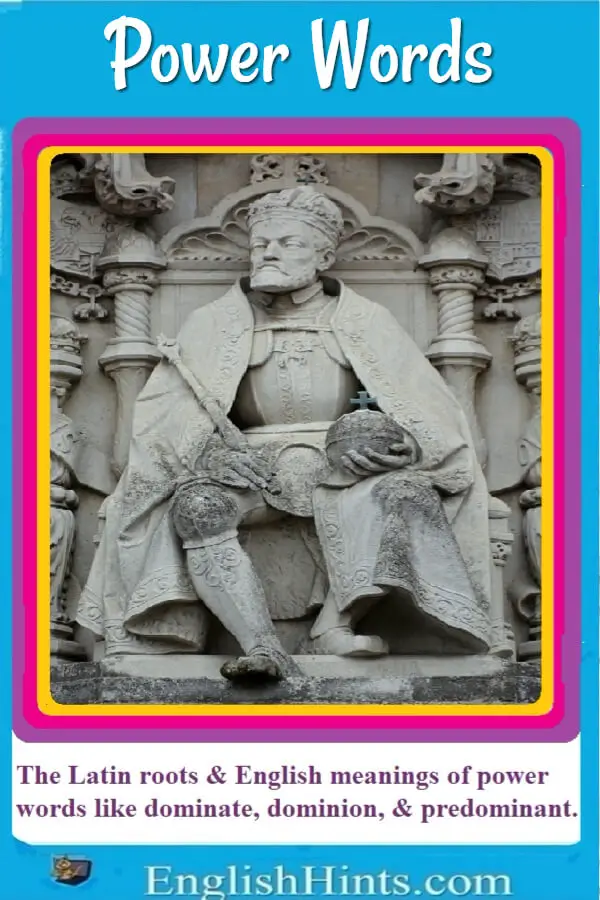Power Words (and more) from the Latin Roots Domus and Dominari
You’ll find these power words (especially ‘dominate’ and ‘predominance’) in almost any discussion of international affairs, politics, or economics.
We can hardly talk about world history without talking about the dominance of different countries and groups during various periods. So they are well worth learning!
Notice how they are used when you come across them in your reading, and try using them yourself.
After reading a little about each of the most common words from these Latin roots, try the linked gap-fill exercise to see examples of their use and to check your understanding.
The Meaning of these Power Words
Domus means ‘house’ or ‘home’ in Latin. Dominus is the master of a house, and dominari is to rule. English words derived from these Latin roots include forms of ‘domain,’ ’domestic,’ ‘dominate,’ ’domineering,’ ‘dominion,’ and ‘predominant.’
A domain was originally the property or estate of a king or of a nobleman. Now we also use it for the area under someone’s (or some government’s) control, a field of knowledge or action (including one in which a person excels so that they ‘own’ it-- it’s “theirs), or the name of a website: (www.____.)
So you might read of “the domain of science” (or of the fine arts, etc.) The ‘public domain’ is things that belong to everyone, not just a particular person. Books or art no longer under copyright are “in the public domain.” Anyone may use them freely.
Domestic is an adjective describing household activities or things that belong to the home life. We also use it to describe the internal affairs of a nation as compared to foreign affairs. (The GDP- gross domestic product-- is a way to measure national prosperity.)
To domesticate an animal is to tame it (make it part of the household.) Dogs, cats, horses, cows, sheep, and chickens have been domesticated; bears, tigers and giraffes have not. The related noun is domestication.
Dominant is an adjective meaning the most important person or animal in a group.
The verb is to dominate, meaning to control, and the related nouns are dominance (mastery over rivals) and domination (control over those who are weak).
Predominance, predominant, and predominate are related forms emphasizing first place and influence rather than raw power.
A person who is domineering is aggressive and unpleasant because of his desire for control.
A king’s dominion is the territory he rules-- his kingdom. To have dominion over something or someone is to have the authority to rule over it (or him).
Examples and Practice
- Hitler expected Germany to dominate Europe for a thousand years, but in fact Germany’s domination lasted less than six years.
- Aristotle took all human knowledge as his domain. His ideas dominated European science and philosophy throughout the Middle Ages.
- Samuel Johnson, a famous English writer, spoke of “the boundless regions of possibility, which fiction claims for her dominion...”
- Text messages used to be sent predominantly by young people, but now many older people also send them.
- The domain name for this website is englishhints.com.
Now check your understanding with a short fill-in (gap-fill): British power vocabulary exercise, (A couple of the gaps have two possible answers.)
Home> Roots, Prefixes, and Suffixes> Power Words.
Didn't find what you
needed? Explain what you want in the search box below.
(For example, cognates, past tense practice, or 'get along with.') Click to see the related pages on EnglishHints.
| site search by freefind | advanced |






